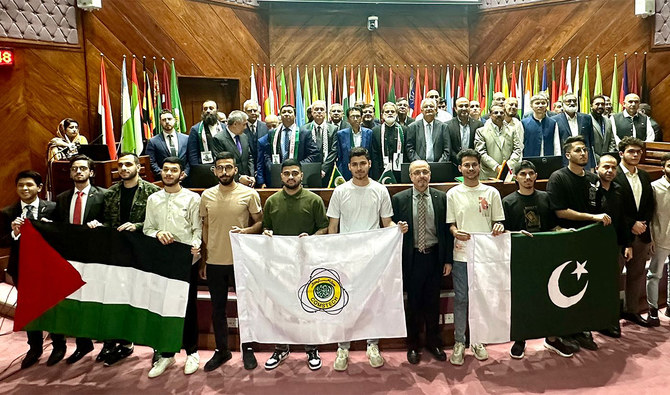ISLAMABAD: The Organization of Islamic Cooperation’s (OIC) Standing Committee on Scientific and Technological Cooperation (COMSTECH) launched the second phase of the Palestine scholarship program on Tuesday, pledging an additional 5,000 fellowships, an initiative that has been greatly appreciated by Palestinian students.
In the first phase in June 2021, the OIC body announced 500 scholarships for Palestinian students, with around 100 currently benefiting from the scheme in various Pakistani universities, covering tuition and hostel fees along with monthly stipends.
“The new scholarship program aims to benefit 1,000 Palestinian students annually over the next five years through collaboration with the Association of Private Sector Universities of Pakistan (APSUP) and member universities of the COMSTECH Consortium of Excellence (CCoE),” Dr. M. Iqbal Choudhary, Coordinator General COMSTECH, said during the launching ceremony in Islamabad.
“The scholarships cover various fields of STEM [science, technology, engineering and mathematics], health and agriculture,” he added.
Choudhary hoped that more Palestinian students would avail the opportunity to get higher education at Pakistan’s top universities despite the challenging situation in Gaza and other areas.
Pakistan’s minister for science and technology Dr. Khalid Maqbool Siddiqui, who attended the ceremony, applauded the “timely initiative,” calling it a gift from his country to the people of Palestine in a difficult time.
“This initiative is a reflection of the inseparable relationship between Palestine and Pakistan at all levels,” he added.
Palestine’s Ambassador to Pakistan Ahmed Jawad Rabei thanked the country for supporting the education of the future generations of Palestinian people amid Israel’s continued occupation and military campaign in Gaza.
“The Palestinians need support from their Muslim brothers, as the children and students of Palestine, who are being killed by the occupants, need someone to support and sponsor them to make them able to keep their narrative alive,” he said.
Rabei noted that Palestine needed an advanced and effective system for education, learning and vocational and technical training.
In his address through a video link from Jeddah, OIC Secretary General, Hissein Brahim Taha, said the program was a beacon of hope amid the challenges being faced by the Palestinian people.
“I invite institutions from other OIC member states to join COMSTECH in expanding the program, thereby encouraging a spirit of fraternal cooperation and assistance to the Palestinians,” he said.
Palestinian students also expressed appreciation for the opportunities provided by these scholarships and vowed to continue their studies despite the challenging circumstances back home.
“It is really helpful, because if I did not have this scholarship, I would be spending all, and we don’t have a lot of money right now,” Abdullah Ibrahim Al-Bardawil, a student from Gaza studying Physiotherapy at the University of Lahore, told Arab News.
He said the current situation of Gaza, resulting from the relentless Israeli bombings, had impacted his studies since he had lost many of his family members in the conflict that had been going on for more than six months.
“At first, it was affecting my studies a lot and I was even finding it difficult to attend my classes,” he continued. “But in the end, we need to have power. We need just to believe and pray to Allah that everything will be fine. But I need to make my family proud and continue my studies.”
Roba Abu Amara, another student from Gaza studying Artificial Intelligence at the Superior University in Lahore, said it was a great opportunity to study in Pakistan, though she expressed concerns for the safety of her family back home.
“My whole family is in Gaza, my father, mother, three brothers and three sisters,” she told Arab News. “I want and I wish them to come here or to get out of Gaza, but it is too hard.”
“I have been unable to talk to them since last week due to the Internet issues,” she added.
Another student from the West Bank, Hamid Sharif, expressed that his experience in Pakistan had been wonderful since he began his studies in computer sciences at the University of Lahore last year.
He said while the situation in the West Bank is not as dire as Gaza, people were also suffering over there.
“We are one community and feel terrible about what is happening to them [people of Gaza],” he said.
“There is nothing for them, no homes, no food, no water to drink,” he continued, adding the world should play its role in ensuring an immediate ceasefire in Gaza.
















